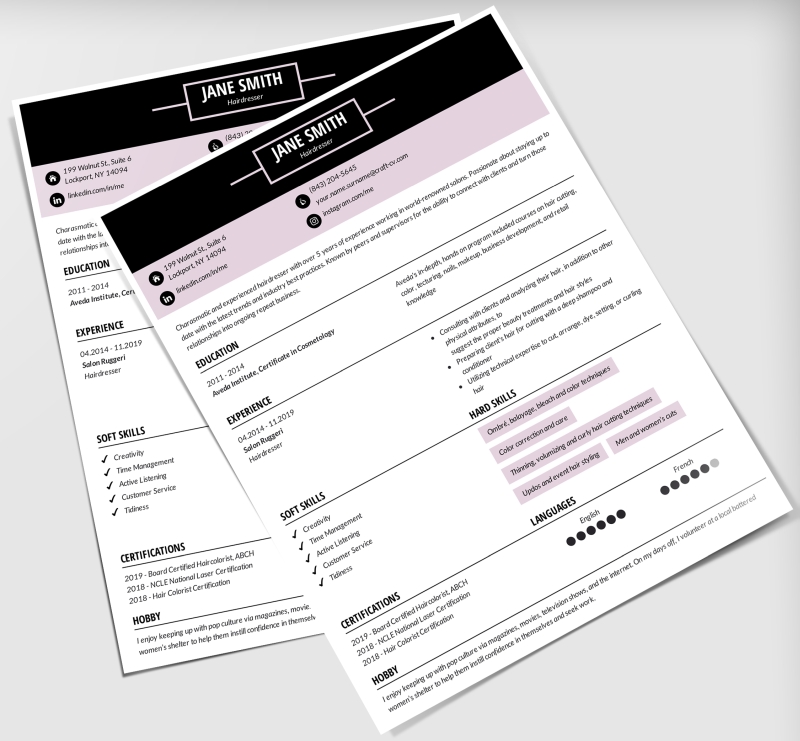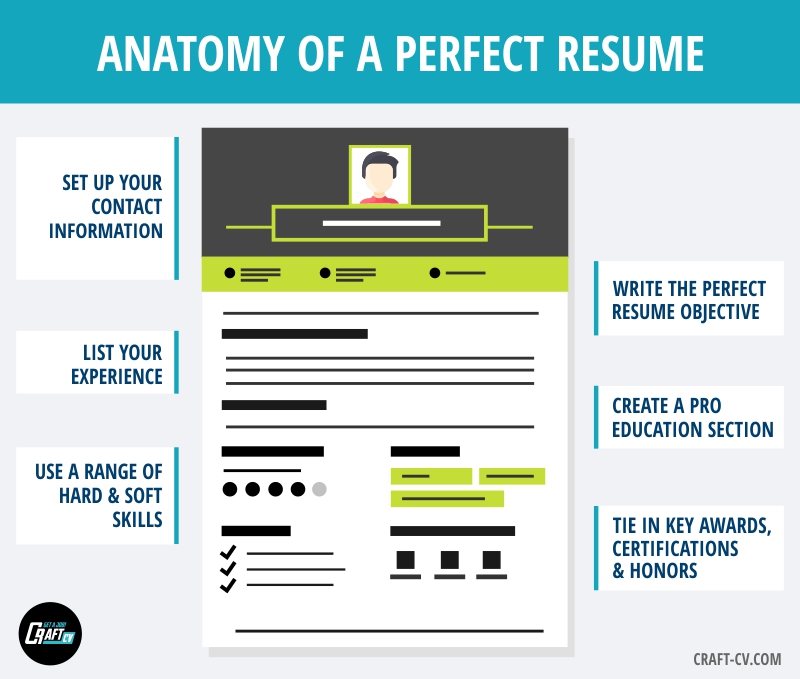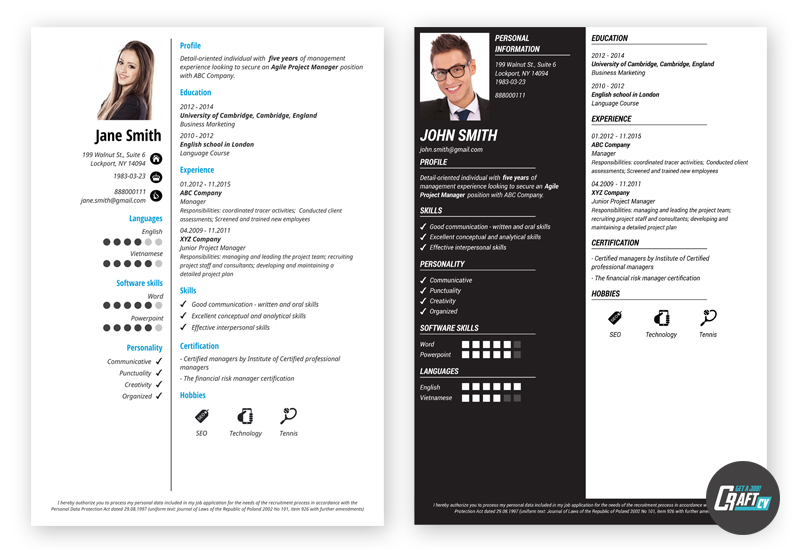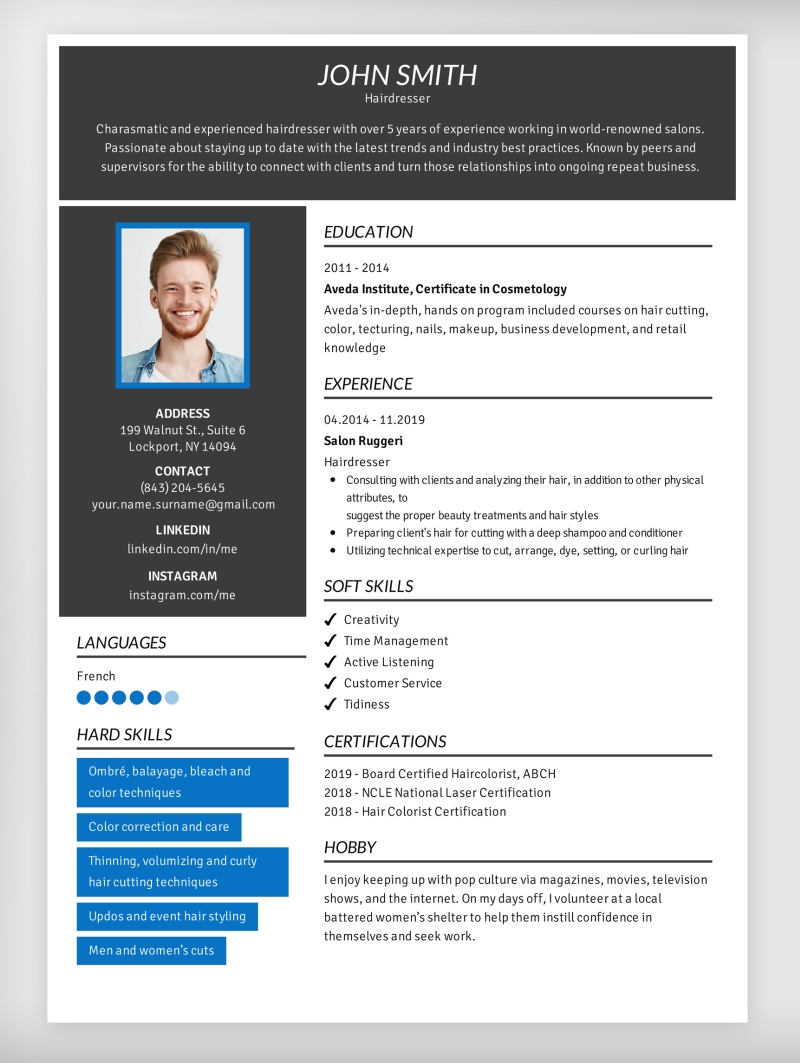Hobbies are one of the basic areas you should cover in a Resume. They may seem easy to describe since most of us have some interests, or at least everyone likes something – but how do you put it into words to not only avoid seeming weird or boring to your employer but most importantly fascinate them?
In this article, I'll answer questions such as:- Why put hobbies on a resume?
- Where to place your interests on a resume?
- How many hobbies should you include in a resume?
- What hobbies are worth mentioning on a resume?
Need to generate a professional resume online right now? CraftCv's resume maker will help you make a professional resume in just a few minutes. With our resume builder, you'll increase your chances of getting a job by perfectly adjusting your resume to the job offer.
INTERESTS ARE NOT EQUAL
– WHAT MATTERS AND WHAT DOES NOT
Interests are something that… interests us. Something we enjoy. Simple as that. It doesn't have to be big. A hobby, on the other hand, is something we hold dear, an activity we love to do regularly.The dictionary tells us as much. :)So, what exactly should we fill the template with? Simply what we do, what we enjoy outside of a work setting, in our free time. Doesn't matter if you indulge in your passion every day or have a few things you enjoy, or if you just like something even though you don't give it much of your time – you have to show in your resume that you like SOMETHING outside of work after all.Want to write a resume that fits your employers' requirements?
WHY WOULD ANYONE CARE
IF I DO SOMETHING OUTSIDE WORK?
Back in the day, an employer expected their employees to commit to the job 100% and not think about anything else, perhaps besides family.Nowadays, the managerial staff's approach has changed. Candidates are expected to have a hobby.Why should you be interested in something and openly talk about it? Because that way you show you:- are dedicated; that you don't just do things out of duty but can do something „extra" without being asked to
- are ambitious; don't want to do the bare minimum, you want to do more
- have a life outside of work (it's, maybe surprisingly, a good thing); people whose lives revolve only around their work get ill more often, have problems with concentrating – everybody has to rest sometimes to give the job their all while they are working; breaks, also in thinking about something, are simply healthy
- are an interesting person; have broad interests and a lot to offer – you never know when your love for traveling or interest in an unpopular language or breeds of dogs will be useful in your job.
HOW TO PROPERLY DESCRIBE HOBBIES ON A RESUME?
#1 HOBBIES WHERE THEY BELONG – WHERE TO PUT INTERESTS ON A RESUME
Hobbies are important but logically less important than, for example, experience – so interests should not be placed first, at the very top of our Resume :)It's a good idea to write it lower, at the bottom, or margin or a side column. In a Resume Builder, you can choose templates that have that column in various places, amongst others.
Besides, you can present your hobbies in a Resume in various ways. You can just write them one after another – or you can make it more interesting, for example choosing a template in which you'll add icons next to hobbies that illustrate them.
For example: - interest in the history of fashion – icon with a hat
- dog paw – volunteering in a shelter, dog breeds, agility jobs
Interests in the Resume – if you choose „written" style

Interests in the Resume – if you choose „graphic" style
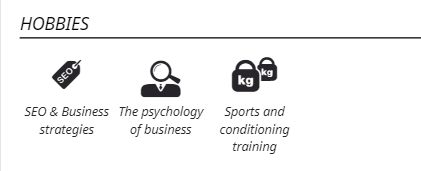
#2 GOTTA CATCH THEM ALL – HOW MANY HOBBIES TO MENTION IN A RESUME
As many as you have and would tell a new friend about if they asked.If there aren't many things that interest you, don't lie – name two, three.And if you have plenty of things you love – don't name all of them. No one will check :) Three or four are perfectly fine.Hobbies are also a part of Resume on which we can save space (if we need, for example, more of it to describe experience), mentioning fewer examples – MORE ON WHAT TO DO WITH A RESUME THAT'S TOO SHORT OR TOO LONG [HERE].
#3 BE PRECISE – SPECIALTY IS IN
I'm interested in music, movies, books, and travel.What do you think about someone like that?Oh well, that's cool, a cultured person, such broad interests.Or maybe a person that is… boring, who didn't know what to say, and so threw in some words that describe most of us?Show yourself in your Resume, the real you. Just like you admit that you haven't finished higher education, and studied this and that on such and such university – talk about your interests just like that, precisely and to the point. For example interest in music – you don't have to name your favorite bands but specify whether you like the history of music or maybe a specific type.If literature – say what genre, historic period, author, topics…
Travels – specify whether extreme, as a hitchhiker, to Africa…If you like coffee, or more precisely different methods of brewing it – write about it! Even if an employer doesn't know what that means, they will ask if they want to.It's not bad to have a popular hobby. Just show that you are genuinely interested in it and know a thing or two about it. And not that your passion for music means nothing more than listening to a random playlist on your way to work... (because it's a bit too little to call it a hobby)
Psychological protip: a more precisely described hobby is easier to believe. Same with everything you give details about. :)
#4 INTERESTS ON A RESUME - CONNECT IT TO THE POSITION
If I want to get a job as a barista, should I write that I'm interested in coffee?Yes and no. On the one hand, it's good to show that you're interested in something you want to do professionally. On the other, you have to be careful to not sound fake.How to make our hobby sound more natural? If you truly want to speak about coffee, say that you're, for example, interested in methods of brewing it or sensory skills.If you're, for example, applying for any position in the fashion industry, it's worth mentioning that you are interested in fashion history, reconstruction of historic outfits, natural jewelry, modeling… anything related to the industry.Do you understand now how you can talk about your hobbies that are related to the potential position in a Resume? :)
#5 SHOW OFF THE SCOPE OF YOUR INTERESTS
Just a reminder – in a Resume we only write the truth. During an interview – yes, they ask about hobbies. And because a lie cannot live forever, it can kill your chances of getting a job.Okay, but what to add to those interests in a Resume? You can write something related to the industry or position, which shows your broad interests. For example:Position: marketing specialist. Interests: SEO, business strategies, event organization.
Position: salesman.
Interests: the psychology of business.
Position: babysitter.
Interests: puppeteering and making balloon animals, educational psychology.
Think about how your interests can help your abilities.
Research says that there are about 50 interested candidates for one offered position. While it's true that a recruiter only spends around 4 minutes on reading a Resume, it's the first 6 seconds that decides whether your application will be rejected or read fully.
THINK ABOUT HOW IT FORMS YOU
How your hobby fits into the position you want is one thing. Another, just as important thing is what your hobby gives you.Let me destroy the myth that may have grown in your head while reading this article: if you think a resume can only have hobbies related to the job, you are mistaken. :)My friend applied for a proofreader position in a newspaper office. In her interests, besides Swedish literature, she mentioned militaria and extreme cross-country running.
Do you think they got interested in her hobby? Or did they not care because it's not related to the job – correcting text – at all?
Sure, the job itself – proofreading – and extreme cross-country running are not connected. But traits you need to have for both, are similar, if not the same. Both a proofreader and runner must be persistent, focused, independent, be able to work under a lot of stress and time pressure.Yes, she got the job :) She's just great at what she does, but her personality, formed by the militaristic interests she mentioned in her resume, worked in her favor.Yet another example:Position: translator. The candidate is interested in cynology, dog training, agility jobs. Generally dogs. They can include it in a resume – why? Because they know extremely specific information, so they can translate nature books, articles on breeding, etc. Or because working with an animal teaches patience and mindfulness, both traits greatly valued in the position.
These are a few examples of how to use a hobby not directly related to the future job. Are you still wondering if you should mention a hobby that is not related to the job in your resume and how to speak about it if a recruiter asks?
I'll ask you a few questions which should help:
- What does the interest give you?
- What did you learn thanks to that interest?
- What personality traits did it form in you?
- What type of personality do you need to enjoy this hobby that is also needed in your profession?
- How can you use your knowledge and experience gained thanks to your hobby to not only work better but also rest better (due to which you will be more effective) and be involved in the worker community life?
It pays off to be passionate – as cliche as it sounds, it's true when we're trying to find a job. It's our hobby – be it even something small you just like to do in your free time. And when you have it, speak proudly about your passion. Even though a recruiter may at first be surprised how crazy and atypical and niche your interest is, they will surely appreciate how interesting of a human you must be.
Besides, if you see and appreciate how fulfilling your hobby is to you, your employer will appreciate it too. The excited look of a candidate talking about their passion can be very convincing in a recruitment process, paired with a good resume of course. :)
More Articles For Resume Writing:

